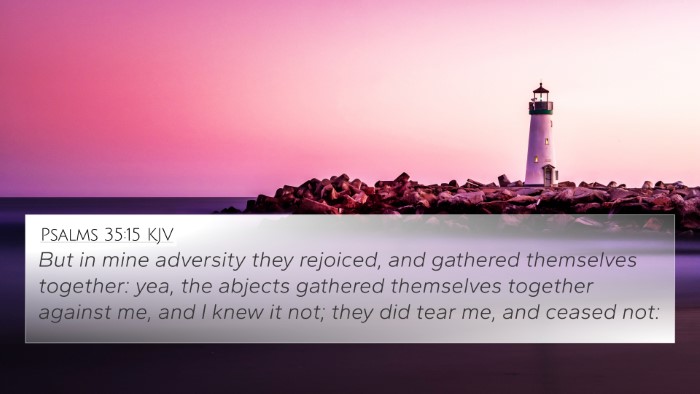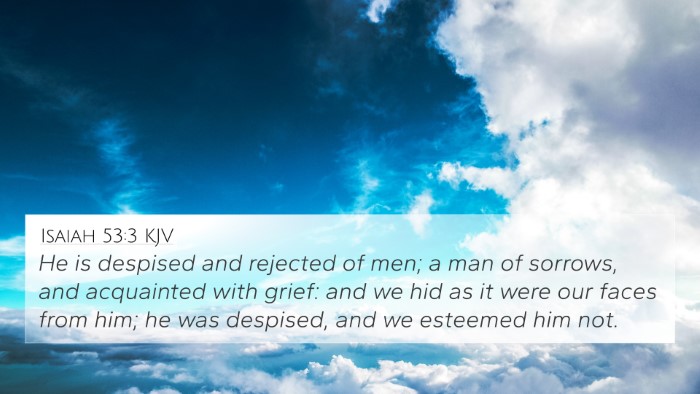Psalms 38:17 - Understanding the Verse
Psalms 38:17 reads: "For I am ready to halt, and my sorrow is continually before me." This verse encapsulates a deep expression of personal sorrow and readiness to acknowledge one’s spiritual and emotional state before God. Here, we will explore the insights and interpretations drawn from various public domain commentaries, including those by Matthew Henry, Albert Barnes, and Adam Clarke.
Verse Meaning and Context
In Psalms 38, the psalmist begins by crying out in distress, encapsulating feelings of guilt, sickness, and sorrow. The verse in question shows the psalmist's readiness to confront the ramifications of his life, indicating a state of awareness of his own weakness and suffering.
Commentary Insights
-
Matthew Henry: Matthew Henry emphasizes the theme of recognition and humility in suffering. The psalmist expresses that he is 'ready to halt,' suggesting an awareness of his limitations and a surrender to the weight of his sins and troubles. Henry notes that this verse highlights the importance of being open about our struggles as part of the healing process.
-
Albert Barnes: Barnes interprets this verse as a reflection of the continual nature of the psalmist's sorrow. He suggests that the psalmist is caught in a cycle of pain that persists in his heart, illustrating that true repentance includes a sense of ongoing sorrow for sin. Barnes connects this sorrow to the need for turning toward God and finding solace in His mercy.
-
Adam Clarke: Clarke focuses on the term 'halt,' interpreting it as a metaphor for being at a standstill due to the heaviness of sorrow. He posits that the psalmist recognizes his spiritual state and desires to seek God’s help. Clarke emphasizes the idea that recognition of one’s suffering is critical for spiritual progress and healing.
Spiritual Themes
The themes presented in Psalms 38:17 resonate deeply within Christian doctrine:
-
Humility in Suffering: The readiness to halt reflects the importance of humility and recognition of our own limitations.
-
Continual Reflection: The awareness of ongoing sorrow speaks to the need for continual introspection and a dependency on God’s grace.
-
Seeking God’s Mercy: The psalmist’s acknowledgment of his sorrow sets a precedent for seeking God’s mercy and forgiveness.
Cross References
This verse can be cross-referenced with several others throughout the Bible, which highlight similar themes of sorrow, repentance, and the pursuit of God’s mercy. Here are some related verses:
- Psalms 6:6: "I am weary with my groaning; all the night make I my bed to swim; I water my couch with my tears." - Expresses deep sorrow similar to that found in Psalm 38.
- Psalms 51:17: "The sacrifices of God are a broken spirit; a broken and contrite heart, O God, you will not despise." - Highlights the importance of a humbled heart before God.
- Matthew 5:4: "Blessed are those who mourn, for they shall be comforted." - Jesus speaks to the blessedness of acknowledging sorrow.
- Isaiah 61:3: "To provide for those who grieve in Zion—to bestow on them a crown of beauty instead of ashes." - Offers hope for those in despair.
- 2 Corinthians 7:10: "For godly grief produces a repentance that leads to salvation without regret." - Sorrow that leads to repentance is key in the Christian faith.
- James 4:10: "Humble yourselves before the Lord, and he will exalt you." - Recognizing one’s lowly state invites God’s intervention.
- 1 Peter 5:7: "Cast all your anxiety on him because he cares for you." - Similar theme of bringing worries before God.
Analytical Connections
The sentiments expressed in Psalms 38:17 can be seen as part of a larger biblical discourse on the human condition—our sufferings, our repentance, and our ultimate need for divine grace.
-
Linking Themes: The link between the Old Testament’s focus on penitence and the New Testament's themes of forgiveness showcases a dialogue across scripture. For instance, Psalms 38's sorrow reflects the New Testament call to repentance found in texts like Luke 13:3, calling believers to turn away from sin.
-
Thematic Continuity: The continuities between Old Testament laments and New Testament teachings about grief and mourning express God's consistent nature in dealing with human brokenness—showing a comprehensive view of divine mercy through prophetic texts alongside Jesus' teachings.
Conclusion
Psalms 38:17 encapsulates the essence of human sorrow acknowledged before God, guiding believers towards a path of healing through recognition of their emotional and spiritual states. Each commentary enriches our understanding, allowing for a deeper engagement with the text and its implications for our lives. By exploring cross-references and thematic connections, we see how this verse not only stands alone but also participates in a broader narrative of grace and redemption throughout scripture.
Further Study Tools
Those looking to delve deeper into the connections between Bible verses can utilize various study tools:
- Utilizing a Bible concordance to find direct word connections.
- A cross-reference Bible study guide can enhance understanding.
- Online Bible reference resources also provide thematic links.
- Consider employing a Bible cross-reference system for targeted studies on similar themes.








